
Bharat Ratna (Hindi: भारत रत्न) is the highest civilian award of the Republic of India. Instituted on 2 January 1954, the award is conferred "in recognition of exceptional service/performance of the highest order", without distinction of race, occupation, position, or sex. The award was originally limited to achievements in the arts, literature, science, and public services but the government expanded the criteria to include "any field of human endeavour" in December 2011. Recommendations for the Bharat Ratna are made by the Prime Minister to the President, with a maximum of three nominees being awarded per year. Recipients receive a Sanad (certificate) signed by the President and a peepal-leaf–shaped medallion; there is no monetary grant associated with the award. Bharat Ratna recipients rank seventh in the Indian order of precedence, but are constitutionally prohibited from using the award name as a title.
The first recipients of the Bharat Ratna were politician C. Rajagopalachari, philosopher Sarvepalli Radhakrishnan, and scientist C. V. Raman, who were honoured in 1954. Since then, the award has been bestowed on 45 individuals including 12 who were awarded posthumously. The original statutes did not provide for posthumous awards but were amended in January 1955 to permit them. In 1966, former Prime Minister Lal Bahadur Shastri became the first individual to be honoured posthumously. In 2013, cricketer Sachin Tendulkar, then aged 40, became the youngest recipient while social reformer Dhondo Keshav Karve was awarded on his 100th birthday. Though usually conferred on Indian citizens, the Bharat Ratna has been awarded to one naturalised citizen, Mother Teresa in 1980, and to two non-Indians, Pakistan national Khan Abdul Ghaffar Khan in 1987 and former South African President Nelson Mandela in 1990. Most recently, Indian government has announced the award to freedom fighter Madan Mohan Malaviya (posthumously) and former Prime Minister Atal Bihari Vajpayee on 24 December 2014.
The Bharat Ratna, along with other personal civil honours, was briefly suspended from July 1977 to January 1980 during the change in the national government and for a second time from August 1992 to December 1995 when several public-interest litigations challenged the constitutional validity of the awards. In 1992, the government's decision to confer the award posthumously on Subhash Chandra Bose met with controversy. Due to the debate surrounding Bose's death, the "posthumous" mention of Bose was much criticised, and his family refused to accept the award. Following a 1997 Supreme Court decision, the press communiqué announcing Bose's award was cancelled; it is the only time when the award was announced but not conferred.
Recipients:
Key
# Naturalized citizen recipient
 Non-citizen recipient
Non-citizen recipient  Posthumous recipient
Posthumous recipient 1954:

C. Rajagopalachari
An Indian independence activist, statesman, and lawyer, Rajagopalachari was the only Indian and last Governor-General of independent India. He was Chief Minister of Madras Presidency (1937–39) and Madras State (1952–54); and a founder of Indian political party Swatantra Party.

Sarvepalli Radhakrishnan
Philosopher Radhakrishnan served as India's first Vice-President (1952–62) and second President (1962–67).Since 1962, his birthday on 5th September is observed as "Teachers' Day" in India.

C. V. Raman
Widely known for his work on the scattering of light and the discovery of the effect, better known as "Raman scattering", Raman mainly worked in the field of atomic physics and electromagnetism and was awarded with theNobel Prize in Physics in 1930.
1955:
Bhagwan Das
Independence activist, philosopher, and educationist, Das is a founder of Mahatma Gandhi Kashi Vidyapith andBenaras Hindu University.

M. Visvesvaraya
Civil engineer, statesman, and Diwan of Mysore (1912–18), Visvesvaraya was knighted as a Commander of the British Indian Empire by King George V. His birthday on 15th September is observed as "Engineer's Day" in India.

Jawaharlal Nehru
Independence activist and author, Nehru is the first and the longest-serving Prime Minister of India (1947–64).
1957:
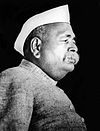
Govind Ballabh Pant
Independence activist Pant was premier of United Provinces (1937–39, 1946–50) and first Chief Minister of Uttar Pradesh (1950–54). He served as Union Home Minister from 1955-1961.
1958:
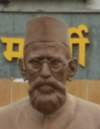
Dhondo Keshav Karve
Social reformer and educator, Karve is widely known for his work related to woman education and remarriage of Hindu widows. He established the Widow Marriage Association (1983), Hindu Widows Home (1896), and startedShreemati Nathibai Damodar Thackersey Women's University in 1916.
1961:
Bidhan Chandra Roy
A physician, political leader, philanthropist, educationist, and social worker, Roy is often considered as "Maker of Modern West Bengal". He was second Chief Minister of West Bengal (1948–62) and his birthday on 1st July is observed as National Doctors' Day in India.
Purushottam Das Tandon
Often titled as "Rajarshi", Tandon was an independence activist and educator. He served as speaker of the Uttar Pradesh Legislative Assembly (1937–50) and was actively involved in a campaign to get official language status to Hindi.
1962:

Rajendra Prasad
Independence activist, lawyer, statesman, and scholar, Prasad was closely associated with Mahatma Gandhi in the non-cooperation movement for Indian independence. He was also elected as the first President of India (1950–62).
1963:
Zakir Husain
Independence activist and education philosopher, Husain served as a Vice Chancellor of Aligarh Muslim University(1948–56) and the Governors of Bihar (1957–62). Later, he was elected as second Vice-President of India (1962–67) and went on to become the third President of India (1967–69).
Pandurang Vaman Kane
Indologist and Sanskrit scholar, Kane is best known for his five volume literary work, History of Dharmaśāstra: Ancient and Medieval Religious and Civil Law in India. The "monumental" work extends over nearly 6,500 pages with the first volume was published in 1930 and last volume published in 1962.
1966:

Lal Bahadur Shastri

Known for his slogan "Jai Jawan Jai Kisan" ("Hail the Soldier, Hail the Farmer"), Independence activist Shastri served as second Prime Minister of India (1964–66) and led the country during Indo-Pakistani War of 1965.
1971:

Indira Gandhi
Former Prime Minister of India (1966–77, 1980–84), Gandhi is also known as the "Iron Lady of India". DuringIndo-Pakistani War of 1971, her government supported Bangladesh Liberation War which led to the formation of a new country, Bangladesh.
1975:
V. V. Giri
Trade unionist Giri was the first Acting President of India and later elected as the fourth President of India (1969–74)
1976:
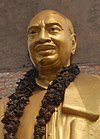
K. Kamaraj

Independence activist and statesman Kamaraj was a former Chief Minister of Tamil Nadu for three terms; 1954–57, 1957–62, and 1962–63.
1980:

Mother Teresa #
Catholic nun and founder of the Missionaries of Charity, Teresa is also known as "Blessed Mother Teresa of Calcutta". She was awarded with Nobel peace prize for her humanitarian work in 1979. She was beatified on 19 October 2003 by Pope John Paul II.
1983:

Vinoba Bhave

Independence activist, social reformer, and a close associate with Mahatma Gandhi, Bhave is best known for hisBhoodan movement, "Land-Gift Movement". He was given the honorific title "Acharya" ("teacher") and was awarded with Ramon Magsaysay Award (1958) for his humanitarian work.
1987

Khan Abdul Ghaffar Khan

Widely known as "Frontier Gandhi", independence activist and Pashtun leader Khan was a follower of Mahatma Gandhi. He joined Khilafat Movement in 1920 and founded Khudai Khidmatgar ("Red Shirt movement") in 1929.
1988:

M. G. Ramachandran

Actor turned politician Ramachandran served as Chief Minister of Tamil Nadu for three terms; 1977–80, 1980–84, 1985–87.
1990:
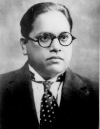
B. R. Ambedkar

Social reformer and leader of the Dalits, Ambedkar was the Chief architect of the Indian Constitution.

Nelson Mandela

Leader of the Anti-Apartheid Movement in South Africa, Mandela was the President of South Africa (1994–99). In 1993, he was awarded with Nobel Peace Prize.
1991:
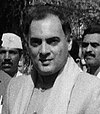
Rajiv Gandhi

Gandhi was the ninth Prime Minister of India serving from 1984 to 1989.

Vallabhbhai Patel

Widely known as "Iron Man of India", Patel was an independence activist and first Deputy Prime Minister of India(1947–50). He was often called with the honorific title "Sardar" ("Leader").

Morarji Desai
Independence activist Desai was the sixth Prime Minister of India (1977–79). He is the only Indian national to be awarded with Nishan-e-Pakistan, highest civilian award given by the Government of Pakistan.
1992:

Abul Kalam Azad

Independence activist Azad was India's first Minister of Education and worked towards free primary education. He was widely known as "Maulana Azad" and his birthday on 11th November is observed as National Education Day in India.
J. R. D. Tata
Industrialist, philanthropist, and aviation pioneer, Tata founded India's first airline Air India and also became the first Indian to get the commercial pilot's license. He is the founder of various institutes in India including the Tata Institute of Fundamental Research, the Tata Memorial Hospital, the Tata Institute of Social Sciences, the National Institute of Advanced Studies, and the National Centre for the Performing Arts.

Satyajit Ray
Having debuted as a director with Pather Panchali (1955), the film-maker Ray is credited with bringing world recognition to Indian cinema. In 1984, Ray was also awarded with the Dadasaheb Phalke Award, India's highest award in cinema.
1997
Gulzarilal Nanda
Independence activist Nanda was two times interim Prime Minister of India (1964, 1966) and two times deputy chairman of the Planning Commission of India.
Aruna Asaf Ali

Independence activist Ali is better known for hoisting the Indian flag in Bombay during the Quit India Movement in 1942. Post Independence, Ali was elected as Delhi's first mayor in 1958.

A. P. J. Abdul Kalam
Aerospace and Defense Scientist, Kalam was involved in the the development of India's first Satellite launch vehicle SLV III and was the architect of Integrated Guided Missile Development Program. He worked for Indian National Committee for Space Research, Indian Space Research Organisation, Defence Research and Development Laboratory and was appointed as the Scientific Advisor to the Defence Minister, Secretary to Department of Defence Research and Development and Director General of Defence Research and Development Organisation. Later, he was elected as the eleventh President of India during 2002 till 2007.
1998:

M. S. Subbulakshmi
Carnatic classical vocalist Subbulakshmi, often hailed as "Queen of songs", is the first Indian musician to receive the Ramon Magsaysay award.

Chidambaram Subramaniam
Independence activist and former Minister of Agriculture of India (1964–66), Subramaniam is known for his contribution towards Green Revolution in India. During late 1970s, he also worked for International Rice Research Institute, Manila, and the International Maize and Wheat Research Institute, Mexico.
1999:
Jayaprakash Narayan

Independence activist, social reformer, and commonly referred as "Lok Nayak" ("People's Hero"), Narayan is better known for "Total Revolution Movement" or "JP Movement" initiated during the mid-1970s to "overthrow the corrupt and exploitative Congress government".

Amartya Sen
Winner of the Nobel Prize in Economic Sciences (1998), Sen has done research over several topics including Social choice theory, ethics and political philosophy, welfare economics, Decision theory, Development economics, public health, and Gender studies.

Gopinath Bordoloi

Independence activist Bordoloi is the first Chief Minister of Assam (1946–50). His efforts and association with then Minister of Home Affairs Vallabh bhai Patel was widely acknowledged while keeping a North-east Indian stateAssam united with India when parts of Assam were to merge with then East Pakistan.
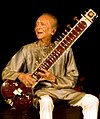
Ravi Shankar
Winner of four Grammy Awards and often considered as "the world's best-known exponent of Hindustani classical music", Sitar player Shankar is known for his collaborative work with Western musician including violinist Yehudi Menuhin and George Harrison.
2001:

Lata Mangeshkar
Widely credited as the "nightingale of India", playback singer Mangeshkar started her career in the 1940s and has sung songs in over 36 languages. In 1989, Mangeshkar was also awarded with the Dadasaheb Phalke Award, India's highest award in cinema.
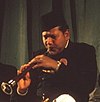
Bismillah Khan
Hindustani classical Shehnai player, Khan played the instrument for more than eight decades and is credited to have bought the instrument to the centre state of India music.
2009:
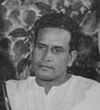
Bhimsen Joshi
Hindustani classical vocalist, Joshi was a disciple of Kirana gharana, Indian musical school. He is widely known for the Khyal genre of singing with a "mastery over rhythm and accurate notes".
2014:

C. N. R. Rao
The recipient of Honorary Doctorates from 63 Universities including Purdue, IIT Bombay, Oxford, chemist and professor Rao has worked prominently in the fields of Solid State and Materials Chemistry, Spectroscopy and Molecular Structure. He also has authored around 1600 research papers and 48 books.

Sachin Tendulkar
Having debuted in 1989, Tendulkar played 664 international cricket matches in total in a career spanned over two decades. He holds various cricket records including the only player to have scored one hundred international centuries, the first batsman to score a double century in a One Day International and the only player to complete more than 30,000 runs in both One Day International and Test cricket.
2015:
Madan Mohan Malaviya

Scholar and educational reformer Malaviya is a founder of Akhil Bharatiya Hindu Mahasabha (1906) and Banaras Hindu University and served as the university's vice-chancellor from 1919 till 1938.[98] He also started a Hindi-language weekly—the "Abhyudaya" (1907), an English-language daily—the "Leader of Allahabad" (1909), and the Hindi monthly—the "Maryada" (1910) and was the Chairman of Hindustan Times from 1924 to 1946.

Atal Bihari Vajpayee
Parliamentarian for over four decades, Vajpayee served as the Prime Minister of India for three terms; 1996, 1998, 1999-2004. Editor-Writer-Poet Vajpayee's published works include "Meri Sansadiya Yatra", "Meri Ikkyavan Kavitayen", "Lok Sabha mein Atalji", "Mrityu Ya Hatya", "Amar Balidan", "Kaidi Kaviraj Ki Kundalian", and "Amar Aag Hai".
***

this is truely important to privy to fundamental processional techniques related to wring. here i am going to noted about paper wring talent as a part of writing interest. This weblog moreover helped me to get some new techniques. IIT JAM Physics Academy
ReplyDeleteArga Education offering CSIR Net best study material for CSIR Net Chemical and Physical Science at best price. We also provide CSIR Net distance learning course and CSIR Net correspondence course. CSIR Net dec 2019 study material and test series now available at eduarga.com. CSIR Net study material for Physical Science
ReplyDelete